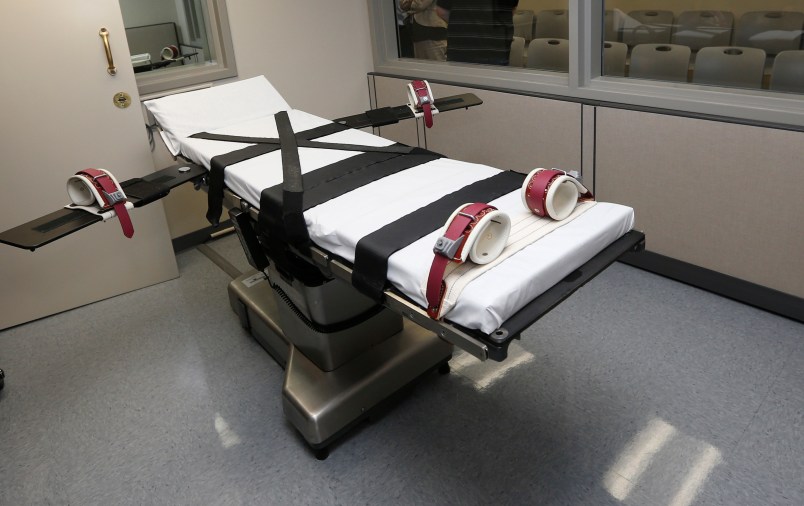COLUMBUS, Ohio (AP) — A federal appeals court on Thursday rejected Ohio’s new three-drug lethal injection process, jeopardizing the upcoming executions of several condemned killers.
In a 2-1 decision, the 6th U.S. Circuit Court of Appeals in Cincinnati found the proposed use of a contested sedative, midazolam, unconstitutional. The court also ruled that Ohio’s planned use of two other drugs the state abandoned years ago prevents their reintroduction in a new execution system.
After repeatedly saying it would no longer use those drugs — pancuronium bromide and potassium chloride — “but now attempting to execute condemned inmates with these very drugs, the State had taken directly contradictory positions,” Judge Karen Nelson Moore ruled for the majority.
The court also favored arguments by attorneys for death row inmates that use of another drug altogether — pentobarbital — is still an option, despite Ohio’s arguments that it can’t find supplies of that drug.
An appeal is likely. Options including asking the full appeals court to consider the case or appealing straight to the U.S. Supreme Court, said Dan Tierney, a spokesman for the Ohio attorney general’s office.
The ruling was a blow to the state, which hoped to begin executing several condemned killers next month. The first of those, Ronald Phillips, is scheduled to die May 10 for raping and killing his girlfriend’s 3-year-old daughter in Akron in 1993.
Allen Bohnert, a lawyer for death row inmates challenging Ohio’s lethal injection system, applauded the decision, saying the appeals court was correct in rejecting the execution process.
Executions have been on hold since January 2014, when inmate Dennis McGuire took 26 minutes to die under a never-before-tried two-drug method that began with midazolam. The same drug was involved in a problematic execution later that year in Arizona.
Ohio announced its three-drug method in October and said it had enough for at least four executions, though records obtained by The Associated Press indicated the supply could cover dozens of executions.
The drugs are midazolam, rocuronium bromide — like pancuronium bromide, a drug used to paralyze inmates — and potassium chloride.
The prison system used 10 milligrams of midazolam on McGuire. The new system calls for 500 milligrams. The state said there’s plenty of evidence proving the larger amount will keep inmates from feeling pain.
Ohio also said the U.S. Supreme Court upheld the use of midazolam in 2015 in a case out of Oklahoma.
The court on Thursday said arguments by death row inmates that even 500 milligrams of midazolam could lead to a risk of pain were more convincing than counterarguments from the state.
Attorneys for death row inmates said Magistrate Judge Michael Merz got it right in a January ruling when he said that the “three-drug midazolam protocol creates a substantial risk of serious harm.”
Those attorneys also said the U.S. Supreme Court case involved evidence unique to Oklahoma. And they said Ohio has an alternative option: finding pentobarbital.
Ohio disagreed and said that over time it asked seven states in vain for the drug. Of the seven, only Georgia, Missouri and Texas appear to have reliable sources of pentobarbital when needed. Those states won’t reveal the source.
Appeals Court Judge Raymond Kethledge dissented in Thursday’s ruling, saying Merz’s ruling doesn’t “provide much support for the conclusion that a 500-milligram dose of midazolam is very likely to leave an inmate conscious enough to feel serious pain.”
On Feb. 10, Republican Ohio Gov. John Kasich delayed eight executions to allow time for the appeals court arguments.
___
Andrew Welsh-Huggins can be reached on Twitter at https://twitter.com/awhcolumbus. His work can be found at http://bigstory.ap.org/content/andrew-welsh-huggins
Copyright 2017 The Associated Press. All rights reserved. This material may not be published, broadcast, rewritten or redistributed.






